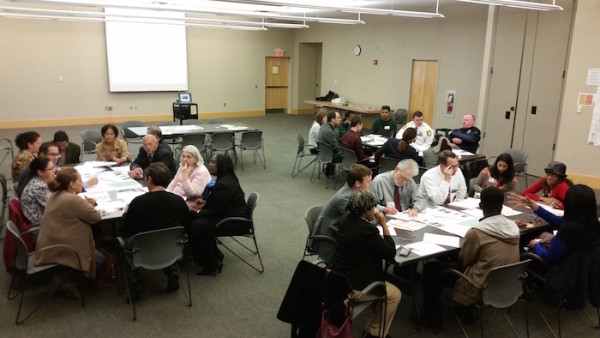A recent City Lab piece by Brentin Mock on why race matters in planning public parks validated for me an important core value shared by Groundwork Trusts and practitioners, which is that everyone— regardless of income, ethnicity, age, gender, ZIP code, or otherwise— deserves equitable access to high-quality parks and open spaces. But delivering on that core value takes intentional work that is skipped over all too often.

There are several reasons why planners and other municipal officials don’t do this work as thoroughly as they could. For one, it requires a sustained investment of time to build trusting relationships and relevant lines of communication with residents— certainly longer than the average election cycle. It also requires thinking beyond one’s own experience and perspective when planning community outreach events and meetings.
For instance, what are the barriers to participation or attendance for the person working the second shift? The single mother with small children? The recent immigrant whose first language isn’t English? Reaching out beyond the familiar faces — those who frequently turn out at City Hall public hearings, zealously fill out municipal surveys, use email as a primary form of communication, and/or speak English as a first language— takes a different way of doing business, a more nuanced, thoughtful strategy. Seeking out oft-marginalized voices takes work — but making good on a commitment to equity and relevance is work worth doing.
It’s no surprise that municipal planning and funding priorities for parks and open spaces— for any investment, really— often appear tone-deaf to the needs of our nation’s most marginalized citizens. Indeed, planning priorities are developed in response to the opinions planners and policymakers hear, which is exactly why it’s so important to change up how, whom, where, and when you ask for input. Groundwork Trusts are committed to developing deep relationships with community constituencies whose voice is least often heard, and we amplify the voices of those folks once they’re sitting around the table weighing in on land use and other issues of concern in their neighborhoods. Our practitioners reach out for input and seek mandates from communities of color and low-moderate income populations precisely because their opinions and needs are most frequently overlooked. We do this, too, because communities of color and low-moderate income communities stand to gain the most from the “healthy community” improvements that don’t come around often enough in places experiencing sustained disinvestment.
Only when we ask ourselves “what barriers might exist that would prevent participation in a given planning process?” — and work earnestly to eliminate those barriers — will we begin to truly meet people where they are. And that, in a nutshell, is one fundamental way we can make community development and redevelopment efforts more relevant, equitable, and inclusive for all.
Kate O’Brien is Groundwork USA’s Director of Capacity Building
